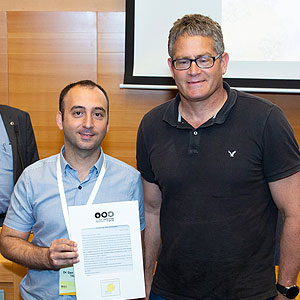Judging by the past, infectious diseases pose the greatest risk for a global catastrophe. Just like the spread of wildfires, early detection of infectious disease and a comprehensive understanding of its transmission dynamics in real-time are instrumental to contain an outbreak. We will develop an algorithm for early detection of influenza transmission by analyzing sensory data from mobile devices. Our work is motivated by exceptional data of 17 billion records, documenting the location of 1.6 million cellular users during the winter of 2012-13, and detailed medical data of influenza cases during this period. Our methodological approach to detect influenza includes the integration of information about 1) the individual, by developing machine learning models to analyze personal-level movement patterns that can indicate a behavioral change due to influenza infection, 2) the general population, by developing a contact network to describe the contact mixing patterns in the Israeli population, based on the cellular location data and demographic data from the Israeli Central Bureau of Statistics, and 3) the disease dynamics, by developing a transmission model for influenza infection. Our study can improve the understanding of the spatiotemporal dynamics of influenza, and set the first step towards the development of a detection system able to identify abnormalities in the population due to a bioterrorist attack or natural-cause epidemic in real-time.
Early detection of infectious diseases using large-scale sensory data from mobile devices
Judging by the past, infectious diseases pose the greatest risk for a global catastrophe. Just like the spread of wildfires, early detection of infectious disease and a comprehensive understanding of its transmission dynamics in real-time are instrumental

Irad Ben-Gal & Dan Yamin
1Department of Industrial Engineering, Faculty of Engineering, Tel Aviv University, Tel Aviv 69978, Israel
Irad Ben-Gal is a full professor and the head of the new "AI and Business Analytics" Lab in the faculty of engineering at Tel Aviv University. He is a visiting professor at Stanford University, teaching "analytics in action" to graduate students and leading the "Digital Life 2030" research initiative. He is a world-known expert in machine learning and predictive analytics with more than 20 years of experience in the field, including R&D collaborations with companies such as Oracle, Intel, GM, AT&T, Applied Materials, Siemens, Kimberly Clark and Nokia. He wrote three books, published more than 100 scientific papers and patents and received numerous awards for his work. Irad is the co-founder and active chairman of CB4 ("See Before"), a startup backed by Sequoia Capital that provides granular predictive analytics solutions to retail organizations. He is an advisory board member in several startup companies that focus on AI.
Dr. Yamin (PhD) is a faculty member at the department of Industrial Engineering at Tel Aviv University, and a former faculty member in the Center of Infectious Disease Modeling and Analysis, in the school of public health at Yale University. Dr. Yamin develops novel infectious disease models by integrating to his research various topics including Applied Probability, Dynamic Modeling, Markov Modeling, Game Theory and Network Science. He published 17 scientific papers in top ranking multidisciplinary- and General Medicine- journals, and received four research prizes awards and three teaching prizes awards. Dr. Yamin’s studies contributed to impact health policy against influenza in Israel, offered novel strategies to eliminate Ebola in the recent outbreak that were implemented in Liberia, and recently developed a model offering new vaccination strategies against Respiratory Scenically Virus (RSV) that is currently being examined by world leading vaccination companies. Dr. Yamin supervised 14 graduate students, and consulted to two leading vaccination companies, Sanofi Pasteur MSD and Merck, on infectious disease modeling.